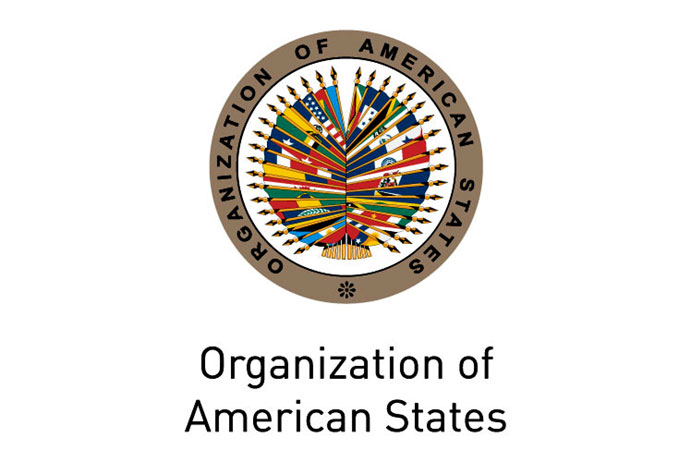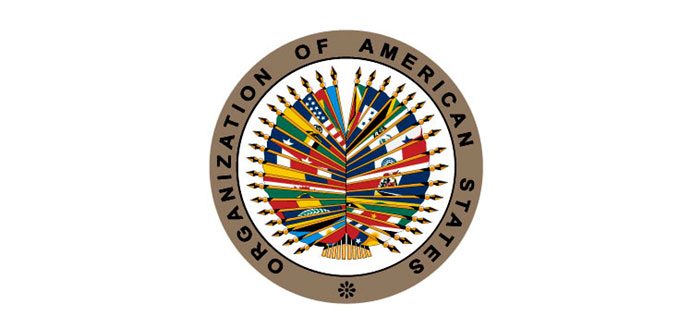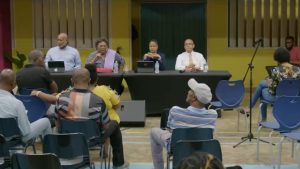
CMC – The Electoral Observation Mission (EOM) of the Organization of American States (OAS) has made several preliminary findings and recommendations for electoral reform in the twin-island state, Antigua and Barbuda, in the aftermath of Wednesday’s general election.
The EOM, which was led by the former Prime Minister of Jamaica Bruce Golding, comprised 11 experts and observers from seven countries, two of whom worked remotely.
On Election Day, the OAS said the team visited the 17 constituencies of Antigua and Barbuda, observing the process from the opening of polling stations, through to the tabulation of ballots and the transmission of results.
The final results gave the Antigua and Barbuda Labor Party (ABLP), of Prime Minister Gaston Browne, nine seats in Antigua; with the main opposition United Progressive Party (UPP) wining six seats; independent candidate Ascot Michael, a former ABLP minister, wining one seat; and the Barbuda People´s Movement (BPM) maintaining the single seat in Barbuda.
The EOM recommendations include electoral organization, delimitation of boundaries, electoral technology, electoral justice, political finance and political participation of women.
The mission, however, said it was “pleased to note” the following actions taken by the Electoral Commission to implement OAS/EOM recommendations presented in 2014: The establishment of a continuous voter registration process; and the development and implementation of an updated, user‐friendly website with ample information about the Commission’s structure and functions, current and previous electoral processes, registration, voting requirements, media links and other services and publications.
Based on its analysis of the electoral system, as well as the information it has gathered through discussions with national and electoral authorities, political parties, civil society and the international community prior to the elections, and its observations on Election Day, the OAS Mission said the updating procedures (cleansing) of the Register of Electors for deceased persons remains “ad hoc in the sense that there are no official procedures established in the current electoral law to facilitate the regularized receipt of pertinent information from other entities as needed.”
In its engagements in the pre‐electoral period, the EOM said it took note of concerns expressed by stakeholders regarding the timing of publication of the Register of Elections.
The Representation of the People (Amendment) Act 2010 specifies that the final Register of Elections should be published no later than 14 days after the Writs of Election have been issued.
In the run up to these elections, the EOM said questions arose as to the correct timing of the publication of the final Register due to varying interpretations of how the 14 days should be counted.
Following indications from the Electoral Commission that the final Register of Elections would be published on January 13, 2023, the EOM said the UPP, in an open letter addressed to the Supervisor of Elections, contended that the Commission’s calculation, which was based on advice provided by the Commission’s Legal Counsel, was incorrect, and that the Register should have been published on January 9, 2023.
Furthermore, the UPP stated that the calculation used by the commission was not in compliance with the law, and that relying on their counsel’s incorrect advice was not an excuse for non‐compliance.
During a conversation with electoral observers, the Supervisor of Elections reiterated the Commission’s support for the advice of their legal counsel, and expressed satisfaction with their decision that the 14‐day period would have ended on January 13, according to the EOM.
It said the supervisor also referenced Section 27 (4) of the 2002 Amendment, which allows the commission to make an order to approve any action taken even when it might not be completely accurate.
The mission, therefore, recommended the introduction of a mandatory home/residence verification procedure to the legal framework, and the establishment of formal procedures for the inter‐institutional exchange of information, which allow for the Antigua and Barbuda Electoral Commission (ABEC) to “systematically obtain the list of deceased persons and other relevant information in order to sanitize the list.”
In its interactions with the Boundaries Commission Chairman, the EOM said it was advised that there is bi‐partisan support for finding a solution to the boundary issue.
In a submission to Parliament, the Boundaries Commission recommended that it be merged with the Electoral Commission.
The mission, therefore, recommended revisiting the related legislation and considering the possibility of utilizing the electors list in order to inform the boundaries realignment, and merging the Electoral Commission and the Constituency Boundaries Commission into a single body, as already recommended in the Constituencies Boundaries Commission Report (2022).
The EOM said the use of information and communication technology in Antigua and Barbuda’s electoral system is limited for the most part to the Register of Electors and the transmission of electoral results.
In order to improve the accuracy of issuing voter ID cards to eligible voters, the EOM recommended that ABEC consider the use of a biometric verification system that crossmatches the elector’s fingerprint with the stored biometric information collected during registration.
Previous OAS/EOMs have noted that the inclusion of technology tools could significantly improve the monitoring and control of electoral processes.
In this regard, the OAS/EOM recommended implementing a central computerized results receiving center, where election results summaries are periodically communicated through a specially designed (using a smartphone, tablet or laptop) computer application from the various constituencies across the island.
It also recommended the introduction of a series of automated checks and verifications that provide “a more exhaustive quality control result system containing mathematical formulas that detect logical inconsistencies and trigger alarms for extreme or unusual results based on historical data.”
In addition, the mission recommended review of contingency plans and procedures to effectively address technological challenges in future elections, and the conduct of an analysis of the system for publishing the results and strengthening the security and performance of the election results publication system.
Although the ABEC website features detailed information about where to vote (through a link to the Register of Electors Polling Division List), the mission recommended improving this function by including a search mechanism that would allow voters to locate their names on the Register of Electors and identify their designated polling station.
In the matter of claims and objections, the EOM said several opposition party representatives and candidates expressed concerns to the mission regarding the manner in which the Electoral Commission dispensed with objections presented to names on the Register of Electors, contending that proper procedures were not followed which, according to them, created a disadvantage for some political parties and candidates, particularly with respect to their ability to adhere to the timelines for claims and objections.
However, in reviewing this issue, the mission said it received information from the Electoral Commission indicating that in accordance with regulations, a registration officer had requested further information from the objectors to assist determining the claim.
But the EOM said the individuals did not provide the requested additional information within the seven days provided by law, “and as such, the claims were dismissed.”
The mission also noted “the complexity” of the objection process and recognized the need to better educate stakeholders as to the procedures to be followed.
Thus, it recommended consideration of modifications to the claims and objections process to facilitate its use by electors, including “public education efforts to better inform citizens of its use and their rights in such matters.”
To ensure greater equity and transparency in the receipt and use of financial contributions during electoral processes, the mission recommended the establishment of “a more robust legislative and administrative system to regulate financial contributions to and expenditure by political parties within or outside of an election that would include limits on the amount of contributions that can be made by individuals.”
It also recommended the establishment of a “continuous campaign accounting and reporting framework” under the electoral law, and that reports to be submitted by political parties to the ABEC include information on financial expenditures in addition to contributions.
Additionally, the EOM recommended providing the ABEC with additional resources, both human and financial, “to more effectively monitor and enforce the implementation of campaign finance law and regulations.”
The mission said while women have attained parity in the Senate, where seats are appointed, they remain “significantly underrepresented” in the elected House of Assembly.
The mission said it observed that the number of women candidates increased from 12.2 percent in the 2014 election to 20.75 percent in the 2023 election.
However, in Tuesday’s elections, it said eight of the 17 constituencies fielded only male candidates.
Electoral results indicate that only one woman holds a seat in the new House of Representatives comprised of 17 members, according to the EOM.
It said this is even lower than the already low number of two representatives of the former conformation of the House.
The mission emphasized these results are “a sign that significant efforts remain to ensure a greater participation and representation of women in politics, particularly to elected office.”
With respect to women’s participation as electors and electoral officials, the mission observed that there is “still incomplete information available on voters disaggregated by sex.”
The EOM said this includes the Register of Electors and the composition of polling stations.
Nevertheless, members of the mission took note that the majority of poll workers in the country were women.
In order to ensure women’s equal representation in decision‐making positions, the OAS Mission recommended, as noted by missions in 2018 and in 2014, that the government, the electoral authority, political parties, civil society organizations, among other actors, work in coordination to develop training, mentoring programs, and other initiatives to promote women’s participation and leadership in politics.
As recommended in 2014, the EOM said political parties must work on the inclusion of affirmative action measures to guarantee the full exercise of political rights of women and the promotion of gender equality in elections, and that the Electoral Commission should compile and publish data disaggregated by sex on its web page.
In addition, the EOM recommended the development of “appropriate mechanisms” to respond to violence and harassment against women candidates, including online abuse.
Such initiatives could include educational campaigns to raise awareness and prevent cases of violence, the mission said.






More Stories
11 local dragsters heading to Vincy event
Kickstart Rush & Wotton register wins in Premier League
St. Joseph residents assured Gov’t addressing their issues